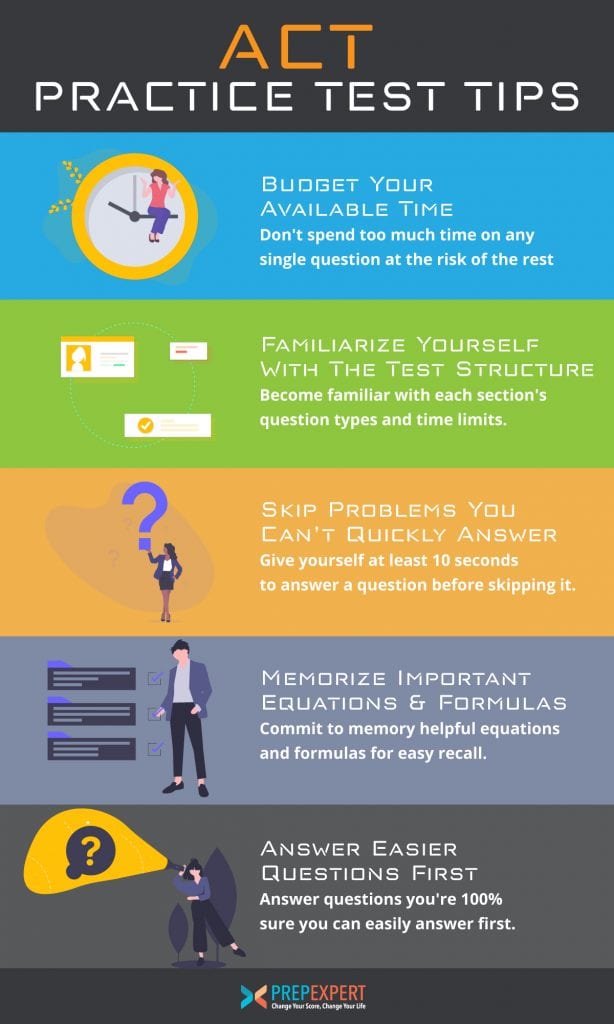ACT Practice Test Tips For Better Results
ACT test prep isn’t about spending countless hours studying equations, readings, and essay prompts. Another important consideration is taking frequent ACT practice tests to discover and sharpen your problem areas.
Take a look at our ACT practice test tips for more focused studying habits and building up confidence with the test format itself.
Here’s how the ACT is structured, to better help you prepare for practice tests.
[act_one]
Budget Your Available Time
Don’t spend too much time on any single question at the risk of the rest.
Remember that every test section is rigorously timed. If you don’t finish every question in that section on time, you can’t go back. As a rule of thumb, it’s best to budget yourself 1-2 minutes for difficult questions.
For easier questions, work on answering them within 20 seconds or so. Those times are tight, but remember each section has a considerable volume of questions to tackle.
When practicing, feel free to take a little longer to answer questions at first, to get your process down. Then, work on shaving down your answering as much as possible.
Familiarize Yourself With The Test Structure
Become familiar with each section’s question types and time limits.
Understand that the ACT is a collection of mini-tests, you must be familiar with how each one works on test day. When working on practice tests, get a feel for:
- How each section asks its questions
- The available answer choice types
- What pace you need to mark down answers
On the test day itself, you won’t be phased by what each section throws at you format-wise.
[act_two]
Skip Problems You Can’t Quickly Answer
Give yourself at least 10 seconds to answer a question before skipping it.
If you have not cracked a question within those first 10 seconds, the best thing to do is circle it and move on. Tricky or unfamiliar questions suck up valuable time as you try to crack it.
While you’re obsessing over one question, you aren’t answering 3-4 easy ones that rack up precious points. Not only that, but the longer you spend on a particularly hard problem, the more anxiety it will create in your head.
Don’t let it psych you out. Just move on. The best part? You can go back and study up for that sort of question afterward.
Memorize Important Equations & Formulas
Commit to memory helpful equations and formulas for easy recall.
Despite the Math test providing a reference list before the questions themselves, take the time to memorize important equations and formulas. Common ones you’ll need include:
- Equation of a line
- Quadratic equation
- Equation of a circle
- Pythagorean theorem
- SOH CAH TOA
Having these equations and formulas memorized provides two major benefits:
- Confidence in your understanding of necessary Math concepts
- Saving yourself time from flipping back to the reference list
Use your practice test sessions to drill these equations and formulas until they become second nature.
Answer Easier Questions First
Answer questions you’re 100% sure you can easily answer first.
Why? Because you’re giving yourself the time to double back and work on the ones giving you trouble.
Mark in your practice exam booklet (or whatever you’re using to access your practice questions) each skipped question so you can quickly find them later on.
After answering all the easy questions, go back, and tackle the more challenging questions. The caveat here is making sure to answer them correctly too.
[act_three]
For more test strategy, college admissions, and scholarship application tips sign up for our FREE class happening right now!
